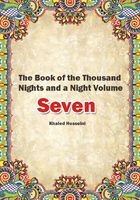
第142章
[229] Two fallen angels who taught men the art of magic. They are mentioned in the Koran (chaps. ii.),and the commentators have extensively embroidered the simple text. Popularly they are supposed to be hanging by their feet in a well in the territory of Babel,hence the frequent allusions to 'Babylonian sorcery'in Moslem writings;and those who would study the black art at headquarters are supposed to go there. They are counterparts of the Egyptian Jamnes and Mambres,the Jannes and Jambres of St.Paul (2 Tim. iii. 8).
[230] An idol or idols of the Arabs (Allat and Ozza) before Mohammed (Koran chaps. ii. 256). Etymologically the word means 'error'and the termination is rather Hebraic than Arabic.
[231] Arab. 'Khayt hamayan'(wandering threads of vanity),or Mukhat alShaytan (Satan's snivel),=our 'gossamer'=God's summer (Mutter Gottes Sommer) or God's cymar (?).
[232] These lines occur in Night xvii.;so I borrow from Torrens (p. 163) by way of variety.
[233] A posture of peculiar submission;contrasting strongly with the attitude afterwards assumed by Prince Charming.
[234] A mere term of vulgar abuse not reflecting on either parent: I have heard a mother call her own son,'Child of adultery.'
[235] Arab. 'Ghaza,'the Artemisia (Euphorbia ?) before noticed. If the word be a misprint for Ghada it means a kind of Euphorbia which,with the Arak (wild capertree) and the Daum palm (Crucifera thebiaca),is one of the three normal growths of the Arabian desert (Pilgrimage iii. 22).
[236] Arab. 'Banat alNa'ash,'usually translated daughters of the bier,the three stars which represent the horses in either Bear,'Charles' Wain,'or Ursa Minor,the waggon being supposed to be a bier. 'Banat'may be also sons,plur. of Ibn,as the word points to irrational objects. So Job (ix. 9 and xxxviii. 32)
refers to U. Major as 'Ash'or 'Aysh'in the words,'Canst thou guide the bier with its sons?'(erroneously rendered 'Arcturus with his sons') In the text the lines are enigmatical,but apparently refer to a death parting.
[237] The Chapters are: 2,3,36,55,67 and the two last ('Daybreak'cxiii. and 'Men'cxiv.),which are called AlMu'izzatani (vulgar AlMu'izzatayn),the 'Two Refugetakings or Preventives,'because they obviate enchantment. I have translated the two latter as follows:
'Say:Refuge I take with the Lord of the Daybreak
from mischief of what He did make
from mischief of moon eclipseshowing
and from mischief of witches on cordknots blowing
and from mischief of envier when envying.'
'Say:Refuge I take with the Lord of men
the sovran of men
the God of men
from the Tempter,the Demon
who tempteth in whisper the breasts of men
and from Jinnis and (evil) men.'
[238] The recitations were Nafilah,or superogatory,two short chapters only being required and the taking refuge was because he slept in a ruin,a noted place in the East for Ghuls as in the West for ghosts.
[239] Lane (ii. 222) first read 'Muroozee'and referred it to the Muruz tribe near Herat he afterwards (iii. 748) corrected it to 'Marwazee,'of the fabric of Marw (Margiana) the place now famed for 'Mervousness.'As a man of Rayy (Rhages) becomes Razi (e.g. Ibn Faris alRazi),so a man of Marw is Marazi,not Muruzi nor Marwazi. The 'Mikna' 'was a veil forming a kind of 'respirator,'defending from flies by day and from mosquitos,dews and draughts by night. Easterns are too sensible to sleep with bodies kept warm by bedding,and heads bared to catch every blast. Our grandfathers and grandmothers did well to wear bonnetsdenuit,however ridiculous they may have looked.
[240] Iblis,meaning the Despairer,is called in the Koran (chaps. xviii. 48) 'One of the genii (Jinnis) who departed from the command of his Lord.'Mr. Rodwell (in loco) notes that the Satans and Jinnis represent in the Koran (ii. 32,etc.) the evilprinciple and finds an admixture of the Semitic Satans and demons with the 'Genii from the Persian (Babylonian ?) and Indian (Egyptian ?) mythologies.'
[241] Of course she could not see his eyes when they were shut;nor is this mere Eastern inconsequence. The writer means,'had she seen them,they would have showed,'etc.
[242] The eyes are supposed to grow darker under the influence of wine and sexual passion.
[243] To keep off the evil eye.
[244] Like Dahnash this is a fanciful P. N.,fit only for a Jinni. As a rule the appellatives of Moslem 'genii'end in us (oos),as Tarnus,Huliyanus,the Jewish innas,as Jattunas;those of the Tarsa (the 'funkers'i.e. Christians) indus,as Sidus,and the Hindus intus,as Naktus (who entered the service of the Prophet Shays,or Seth,and was converted to the Faith).
The King of the Genii is Malik Katshan who inhabits Mount Kaf;and to the west of him lives his soninlaw,Abd alRahman with 33,000 domestics: these names were given by the Apostle Mohammed.
'Baktanus'is lord of three Moslem troops of the wandering Jinns,which number a total of twelve bands and extend from Sind to Europe. The Jinns,Divs,Peris ('fairies') and other preAdamitic creatures were governed by seventytwo Sultans all known as Sulayman and the last I have said was Jan bin Jan. The angel Haris was sent from Heaven to chastise him,but in the pride of victory he also revolted with his followers the Jinns whilst the Peris held aloof. When he refused to bow down before Adam he and his chiefs were eternally imprisoned but the other Jinns are allowed to range over earth as a security for man's obedience.
The text gives the three orders. flyers. walkers and divers.
[245] i.e. distracted (with love);the Lakab,or poetical name,of apparently a Spanish poet.